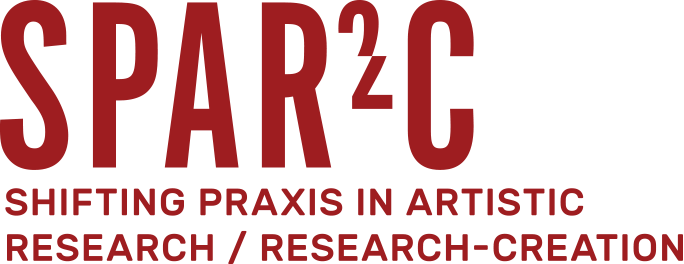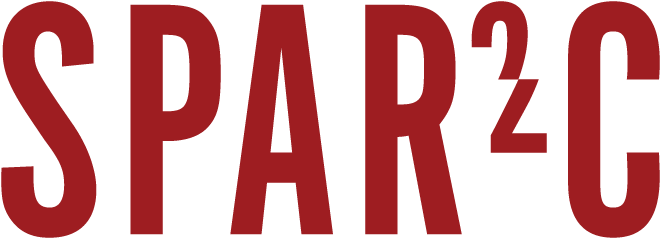October 21, 2021
9:30–11:00 am MST
Panel
Research-Creation & Social/Ecological Justice
Live Captioning and ASL interpretation
Register at
Eventbrite
Over the past few decades, research-creation has been increasingly institutionalized as a scholarly method grounded in the visual arts while fostering interdisciplinary methods and outputs across the academy. This panel will examine the different, overlapping, and divergent ways that research-creation has been and is being mobilized in research programs and labs committed to social and ecological justice. Specifically, it will consider the value and limits of research-creation for remaking our institutional and scholarly spaces.
Moderator:
Natalie Loveless – Associate Professor, Contemporary Art and Theory, University of Alberta
Panelists:
Krista Lynes - Canada Research Chair, Feminist Media Studies and Associate Professor, Communication Studies, Concordia University
Arseli Dokumaci - Canada Research Chair, Critical Disability Studies and Media Technologies and Assistant Professor, Communication Studies, Concordia University
Danielle Peers - Canada Research Chair, Disability and Movement Cultures and Associate Professor, Faculty of Kinesiology, Sport, and Recreation, University of Alberta
Zoe Todd – Co-founder, the Institute for Freshwater Fish Futures and Associate Professor, Carleton University
Photo credit: Stephanie Loveless
Natalie Loveless is Associate Professor, Contemporary Art and Theory, at the University of Alberta, located on Treaty Six territory. Loveless directs the Research-Creation and Social Justice CoLABoratory and is author of How to Make Art at the End of the World: A Manifesto for Research-Creation (Duke UP 2019), editor of Knowings and Knots: Methodologies and Ecologies in Research-Creation (University of Alberta Press 2019), and co-editor of Responding to Site: The Performance Work of Marilyn Arsem (Intellect Press 2020). Loveless has held fellowships and visiting positions in the Centre for Interdisciplinary Studies in Society and Culture (CISSC) at Concordia University in Montreal, the Center for the Humanities at the University of Utrecht, and Western University, and in 2020 was elected to the Royal Society of Canada (College of New Scholars, Artists, and Scientists) for her scholarship at the intersection of research-creation and social and ecological justice.
Krista Lynes is Canada Research Chair in Feminist Media Studies and Associate Professor in Communication Studies at Concordia University. She is also the co-director of the Feminist Media Studio, which provides a space for media creation and critical engagement with intersectional and gender-based forms of oppression and exploitation. She is the author of Prismatic Media, Transnational Circuits: Feminism in a Globalized Present and co-editor of the Open Access anthology Moving Images: Mediating Migration as Crisis. Her current research project, Greenhouse Effects: The Mediation of Life and the Migration of Labor, seeks to explore how greenhouses have been a central infrastructure for the racialized, classed, and gendered global movement of humans, plants, animals, knowledge and culture over the last several centuries and today.
Zoe Todd is a Métis artist and researcher who studies Indigenous perspectives on freshwater fish conservation in western Canada (specifically, Alberta). Their fish philosophy work brings together Indigenous science, art, social studies, stories, and legal thinking about fish as more-than-human kin. Their current projects examine how Indigenous governance shapes and refracts western fish conservation paradigms.They are a co-founder of the Institute for Freshwater Fish Futures (2018), which is an international collective of scientists, artists, writers, landscape architects, architects, environmentalists, journalists, and community leaders dedicated to honouring reciprocal responsibilities to freshwater fish in watersheds locally and globally.
Arseli Dokumaci is Canada Research Chair in Critical Disability Studies and Media Technologies and the director of the AIM (Access in the making) Lab. Arseli is an interdisciplinary scholar and creative practitioner. Her scholarly and creative work lies at the crossovers of disability studies, performance studies, media studies and medical anthropology. In her research, and research-creation videos, Arseli explores how disabled people go about their everyday lives, and come up with micro, improvisational solutions that she theorizes as activist affordances. Arseli is particularly interested in exploring how disability can be a critical method to rethink and practice media in new ways. Her research appeared in Current Anthropology, The South Atlantic Quarterly, Disability Studies Quarterly, Performance Research, and in other journals and edited collections. Arseli is currently launching a four-year SSHRC-funded interdisciplinary team project, entitled "Mobilizing disability survival skills for the urgencies of the Anthropocene". For further information, please visit: accessinthemaking.ca
Danielle Peers (they/them) is a Canada Research Chair (Tier II) in Disability and Movement Cultures, and an Assistant Professor in the Faculty of Kinesiology, Sport, and Recreation at the University of Alberta, on Treaty Six Territory. Peers studies how movement cultures (including art, recreation, and sport) can be used to transmit and transform a community’s values, politics, and (in)equities. Mobilizing embodied disability justice approaches, Peers prioritizes deep, intersectional collaborations in order to co-create knowledges and practices that reduce harm and create more accessible, affirming, and transformative movement cultures. They engage a range of methodologies including using both dance and film in their arts-based and research-creation projects. Danielle has toured eight films in juried festivals, most recently the dance-on-film Inclinations which was co-created with Alice Sheppard.


